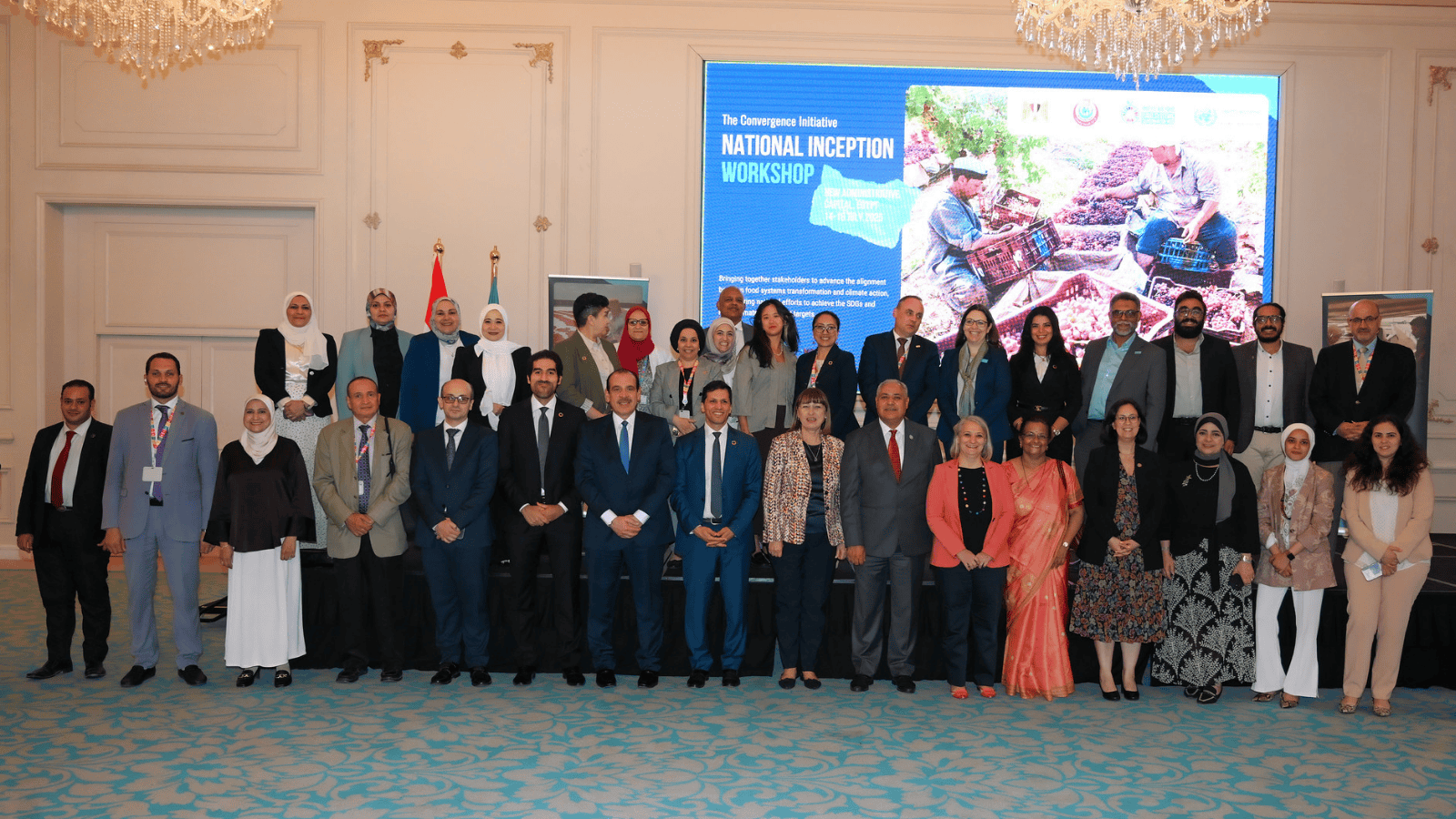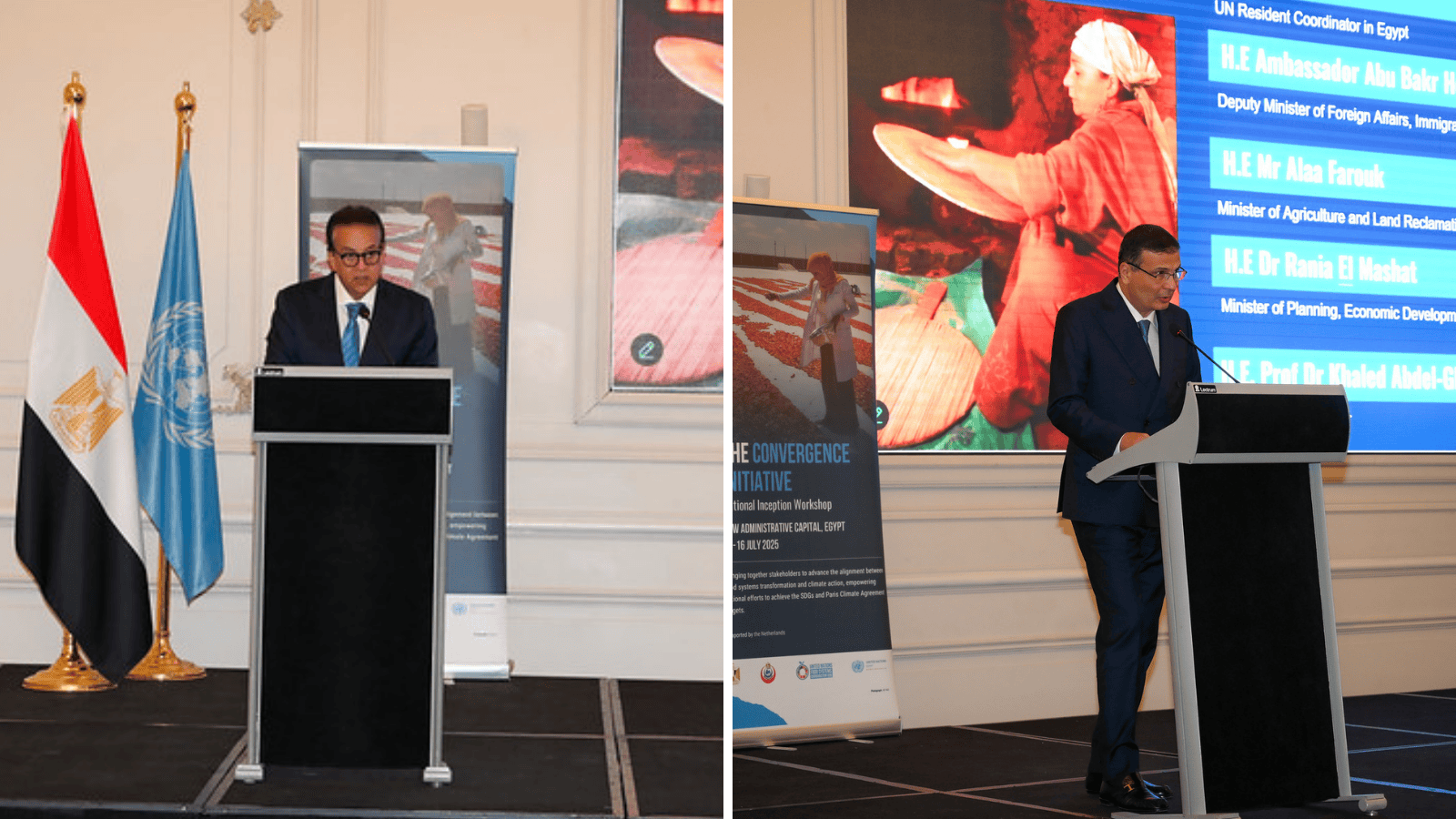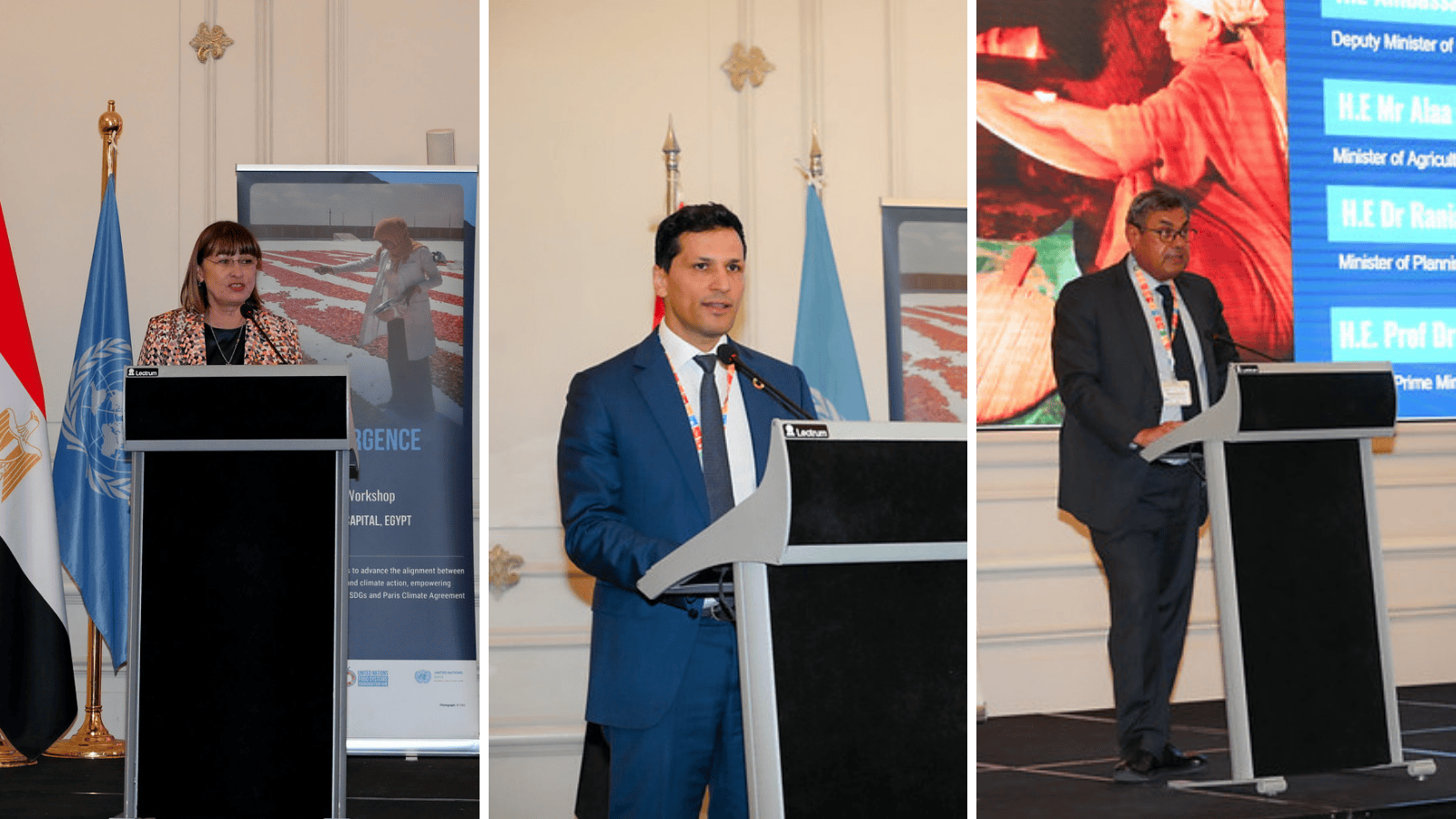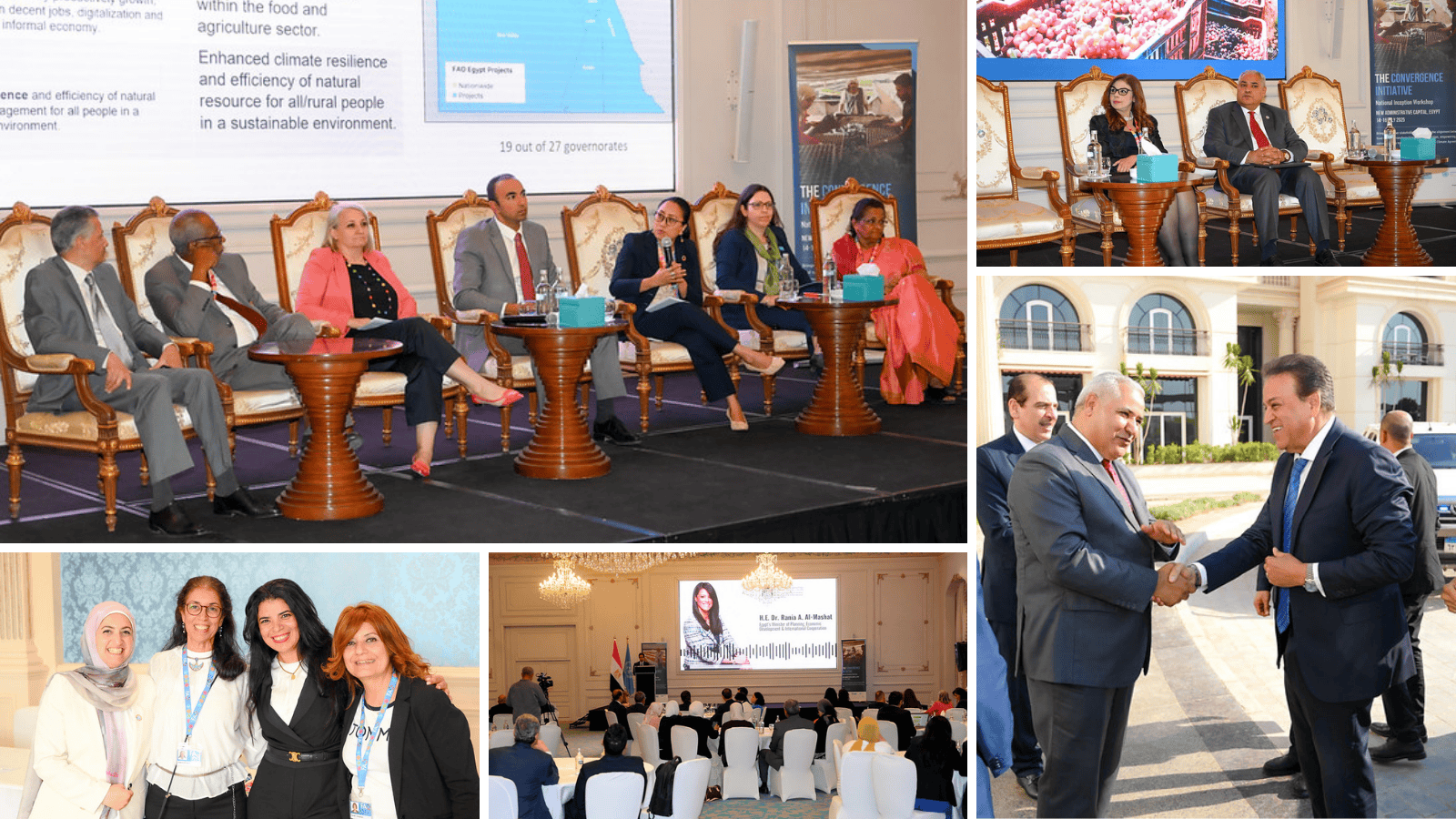Egypt joins global effort linking food, climate, and health with launch of the Convergence Initiative

Cairo, Egypt | July 2025 – Egypt has officially joined the Convergence Initiative, a UN-backed effort to better connect food systems transformation, climate action, and public health. Central to this effort is the Convergence Action Blueprint (CAB) – a nationally owned roadmap to align policies, investments, and priorities across food, climate, health, and finance.
The initiative was launched during a high-level inception workshop in the New Administrative Capital, gathering more than 80 representatives from government institutions, the UN system, and development partners. Convened under Egypt’s National Committee on Food Systems and Nutrition, chaired by the Prime Minister, the workshop opens the way for more integrated and resilient policymaking.
“This blueprint reflects our national priorities, strengthens multisectoral coordination, and lays the groundwork for long-term resilience. We must ensure it is implemented with discipline, data, and determination.” – H.E. Prof. Khaled Abdel-Ghaffar, Deputy Prime Minister of Egypt and Minister of Health and Population.
Food and climate in Egypt
Egypt’s food system is central to its economy, contributing over 11% of GDP and employing nearly 28% of the workforce. Yet it faces interconnected challenges: climate threats, water scarcity, high production costs, heavy reliance on imports, and a growing triple burden of malnutrition—undernourishment, obesity, and child anemia. These pressures are amplified by rapid population growth and environmental degradation, placing even greater strain on limited land and water resources.
In recent years, Egypt has made commendable progress through national strategies targeting agriculture, nutrition, and environmental sustainability. Frameworks such as Egypt Vision 2030, the Sustainable Agricultural Development Strategy, the National Climate Change Strategy 2050 (NCCS), and the Nexus of Water–Food–Energy (NWFE) platform, demonstrate strong policy intent. Food security and nutrition strategies, including the national pathway for food systems transformation, the National Nutrition Strategy, and the Golden 1,000 Days Initiative, target critical health and development outcomes.
“Egypt was among the first in the region to conduct a full national food systems dialogue, bringing together government, private sectors of society and academia to reimagine the way our food systems work. That dialogue formed the basis of our national pathway. We launched our climate change strategy 2050 because we understand that food security and climate resilience are two sides of the same coin.” – H.E Prof Dr. Khaled Abdel-Ghaffar.
On the global stage, Egypt has played a key role in linking food and climate agendas, notably through its presidency of COP27, where it hosted the first-ever Agriculture Day and spearheaded initiatives such as the Initiative on Climate Action and Nutrition (ICAN) and the FAST Partnership.
“Under the global and regional challenges that we face, the need for sustainable food systems is becoming more urgent than ever. The transformation is not an option, it's a necessity. The Egyptian state has taken unprecedented steps to achieve the food security and improve the livelihood of the citizens.” – H.E Mr Alaa Farouk, Minister of Agriculture and Land Reclamation.

Left to right: H.E. Prof. Khaled Abdel-Ghaffar, Deputy Prime Minister of Egypt and Minister of Health and Population; H.E Mr Alaa Farouk, Minister of Agriculture and Land Reclamation.
Building cross-sector solutions
The workshop saw active participation from UN agencies, which highlighted ongoing national efforts—from infant nutrition programs and maternal health standards to climate-resilient infrastructure and green health initiatives. The discussions reaffirmed the UN’s commitment to supporting Egypt through evidence-based policymaking, strengthened local governance, and youth engagement.
Despite progress, one major gap remains: the lack of strong institutional mechanisms to align timelines, financing, and goals across sectors. The Convergence Initiative—through the Convergence Action Blueprint—aims to close this gap by fostering collaboration and ensuring coherence between food, climate, health, and finance policies.
“The Convergence Initiative is not just relevant—it is essential,” said Ms. Elena Panova, UN Resident Coordinator in Egypt. “By aligning strategies, mobilizing financing, and driving cross-sector solutions, it delivers real impact for people and the planet. With a population of 108 million, Egypt faces converging threats—food insecurity, climate stress, and malnutrition—which must be addressed together.”
“Egypt's Convergence Initiative is not only nationally significant, but also globally relevant. Egypt is among the first 10 countries to implement the Convergence Initiatives. With its strong institutions and deep ties across the Arab and African regions, Egypt is well placed share its experience and inspire others.” – Khaled Eltaweel, UN Food Systems Coordination Hub.
Developing the Convergence Action Blueprint (CAB)
Over three days, stakeholders co-developed the CAB, identifying priority actions to:
- Strengthen governance and coordination
- Align policy and planning
- Advance joint programming in health, nutrition, agriculture, and environment
- Boost finance and investment for integrated solutions
“This is a true opportunity to turn current challenges into innovative solutions for communities,” – H.E. Ambassador Abu Bakr Hefny Mahmoud, Deputy Minister of Foreign Affairs.

Left to right: Ms. Elena Panova, UN Resident Coordinator in Egypt; Khaled Eltaweel, Senior Programme Coordinator at the UN Food Systems Coordination Hub; H.E. Ambassador Abu Bakr Hefny Mahmoud, Deputy Minister of Foreign Affairs.
Next steps
Egypt is the second Arab country and the third in Africa to implement the Convergence Initiative. With UNFSS+4 now concluded, the focus shifts from planning to delivery. The Blueprint will guide the upcoming Joint SDG Fund programme and align investments and policies across food, climate, health, and finance.
In the lead-up to COP30, Egypt will track and share early results so lessons feed into national action and global learning. Continued collaboration among government entities, UN agencies, development partners, and local stakeholders will be essential to translate the Blueprint into real benefits for communities: more resilient livelihoods, healthier diets, smarter use of land and water, and climate-ready services. This is a clear, shared path forward—and an opportunity for Egypt to demonstrate leadership on integrated food, climate, and health solutions at COP30 and beyond.

